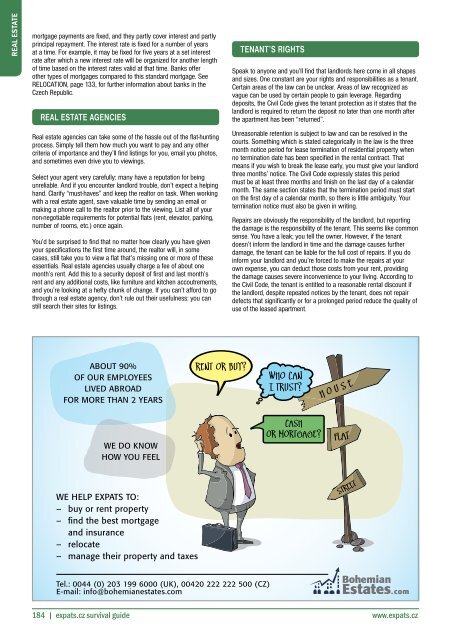p17tb85kpn4am1jcl1n5h13maat24.pdf
Create successful ePaper yourself
Turn your PDF publications into a flip-book with our unique Google optimized e-Paper software.
eal estate<br />
mortgage payments are fixed, and they partly cover interest and partly<br />
principal repayment. The interest rate is fixed for a number of years<br />
at a time. For example, it may be fixed for five years at a set interest<br />
rate after which a new interest rate will be organized for another length<br />
of time based on the interest rates valid at that time. Banks offer<br />
other types of mortgages compared to this standard mortgage. See<br />
RELOCATION, page 133, for further information about banks in the<br />
Czech Republic.<br />
ReAl eStAte AGencieS<br />
Real estate agencies can take some of the hassle out of the flat-hunting<br />
process. Simply tell them how much you want to pay and any other<br />
criteria of importance and they’ll find listings for you, email you photos,<br />
and sometimes even drive you to viewings.<br />
Select your agent very carefully: many have a reputation for being<br />
unreliable. And if you encounter landlord trouble, don’t expect a helping<br />
hand. Clarify “must-haves” and keep the realtor on task. When working<br />
with a real estate agent, save valuable time by sending an email or<br />
making a phone call to the realtor prior to the viewing. List all of your<br />
non-negotiable requirements for potential flats (rent, elevator, parking,<br />
number of rooms, etc.) once again.<br />
You’d be surprised to find that no matter how clearly you have given<br />
your specifications the first time around, the realtor will, in some<br />
cases, still take you to view a flat that’s missing one or more of these<br />
essentials. Real estate agencies usually charge a fee of about one<br />
month’s rent. Add this to a security deposit of first and last month’s<br />
rent and any additional costs, like furniture and kitchen accoutrements,<br />
and you’re looking at a hefty chunk of change. If you can’t afford to go<br />
through a real estate agency, don’t rule out their usefulness: you can<br />
still search their sites for listings.<br />
ABOUT 90%<br />
OF OUR EMPLOYEES<br />
LIVED ABROAD<br />
FOR MORE THAN 2 YEARS<br />
WE DO KNOW<br />
HOW YOU FEEL<br />
WE HELP EXPATS TO:<br />
– buy or rent property<br />
– nd the best mortgage<br />
and insurance<br />
– relocate<br />
– manage their property and taxes<br />
RENT OR BUY?<br />
Tel.: 0044 (0) 203 199 6000 (UK), 00420 222 222 500 (CZ)<br />
E-mail: info@bohemianestates.com<br />
tenAnt’S RiGhtS<br />
Speak to anyone and you’ll find that landlords here come in all shapes<br />
and sizes. One constant are your rights and responsibilities as a tenant.<br />
Certain areas of the law can be unclear. Areas of law recognized as<br />
vague can be used by certain people to gain leverage. Regarding<br />
deposits, the Civil Code gives the tenant protection as it states that the<br />
landlord is required to return the deposit no later than one month after<br />
the apartment has been “returned”.<br />
Unreasonable retention is subject to law and can be resolved in the<br />
courts. Something which is stated categorically in the law is the three<br />
month notice period for lease termination of residential property when<br />
no termination date has been specified in the rental contract. That<br />
means if you wish to break the lease early, you must give your landlord<br />
three months’ notice. The Civil Code expressly states this period<br />
must be at least three months and finish on the last day of a calendar<br />
month. The same section states that the termination period must start<br />
on the first day of a calendar month, so there is little ambiguity. Your<br />
termination notice must also be given in writing.<br />
Repairs are obviously the responsibility of the landlord, but reporting<br />
the damage is the responsibility of the tenant. This seems like common<br />
sense. You have a leak; you tell the owner. However, if the tenant<br />
doesn’t inform the landlord in time and the damage causes further<br />
damage, the tenant can be liable for the full cost of repairs. If you do<br />
inform your landlord and you’re forced to make the repairs at your<br />
own expense, you can deduct those costs from your rent, providing<br />
the damage causes severe inconvenience to your living. According to<br />
the Civil Code, the tenant is entitled to a reasonable rental discount if<br />
the landlord, despite repeated notices by the tenant, does not repair<br />
defects that significantly or for a prolonged period reduce the quality of<br />
use of the leased apartment.<br />
WHO CAN<br />
I TRUST?<br />
CASH<br />
OR MORTGAGE?<br />
H O U S E<br />
184 letak | expats.cz FIN.indd survival 1 guide 11/26/12 www.expats.cz 6:09 PM<br />
FLAT<br />
STREET


